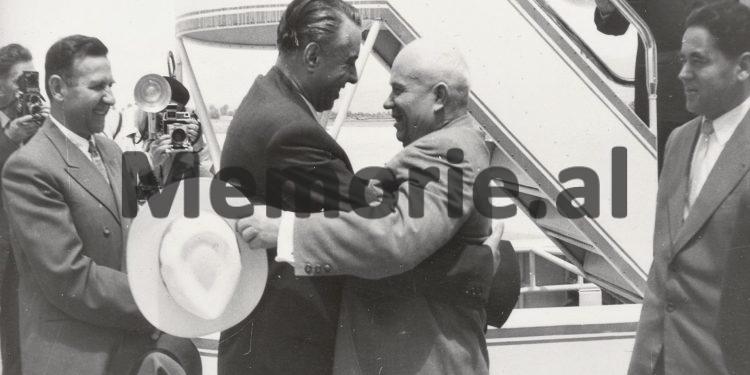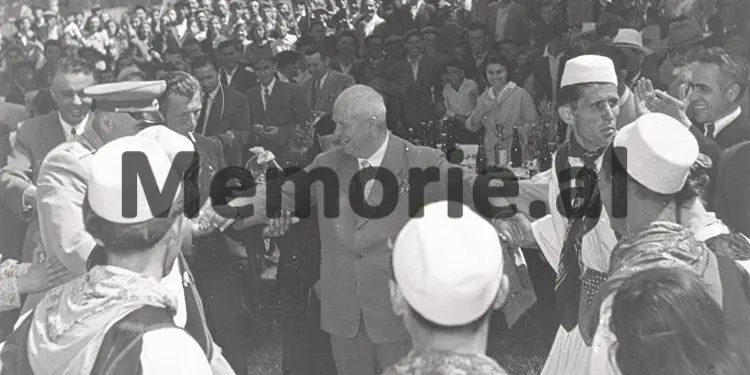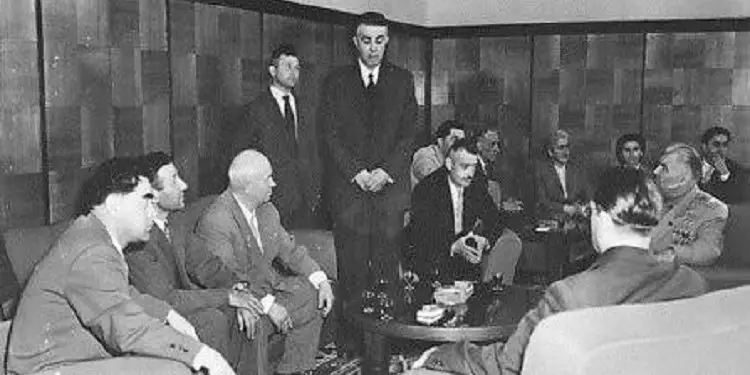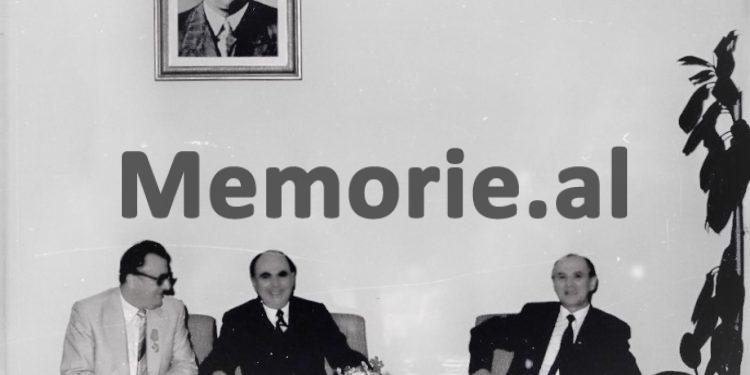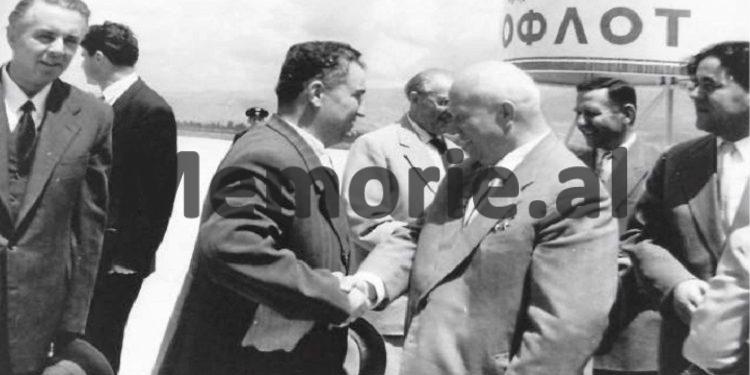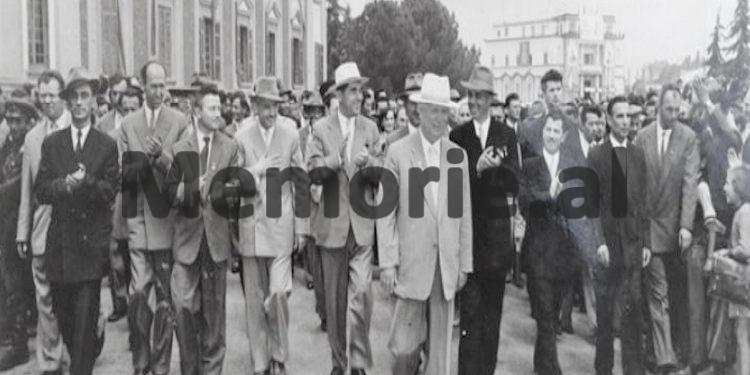By Fatos Veliu
The first part
Memorie.al / In May 1959, an urgent telegram from Tirana informed him that he had to urgently return to Albania. Agim Popa, the philosophy student, realized that something big had happened, but he would only understand the true significance of that telegram upon arriving in the capital. In the Central Committee of the PPSh, they would communicate with the appropriate pomp that he had been entrusted with the task of the main translator during Nikita Khrushchev’s visit to Albania. In this interview, Mr. Popa, among other things, also testifies for the first time what were Khrushchev’s statements and remarks, after the quintessence, with the then senior leaders of communist Albania, during the two-week visit he made to Albania, visiting Shkodra, Korça , Vlorë, Butrint, etc., the aggravated situation during the Meeting of the 81st Communist Workers’ Parties in Moscow, where Khrushchev and his supporters, such as the head of the Communist Party of Spain, Dolorez Ibarruri (“The Passionate”) and Wlodislav Gomulka of Poland, burst into insults and accusations during Enver’s speech, caution and fear in the embassy premises from eavesdroppers, until the trip with the “Quin Elisabet” steamer to New York, where the meeting of the UN General Assembly would take place, where the Albanian delegation, it was headed by the prime minister, Mehmet Shehu with Nesti Nasen, and on board that trans-oceanic ship, Josif Broz Tito traveled with Winston Churchill’s son, Randolph, who asked to meet Mehmet Shehu!
Mr. Agim, you are known as the man who translated the highest state personalities of that time, even personalities of international rank, such as Nikita Khrushchev in the 60s. Were you organically assigned to this task?
It is true that I have translated Enver Hoxha in many meetings, just as I have translated Mehmet Shehu or various delegations that have come to Albania, up to Nikita Khrushchev, whom you also pointed out, but I want to clarify one thing, related to this issue.
I have not been a translator by profession. Nor has he ever had such a function as Enver Hoxha’s translator. When there was a need to translate, people who knew the relevant language relatively well, regardless of their place of work, were activated.
You said that you translated Nikita Khrushchev during his sensational visit to Albania in those years?! How exactly where you assigned such a task?
It was May 1959, when the Soviet leader made a historic visit to Albania. At that time, I was in Moscow, to give the postgraduate exams in philosophy. I don’t know who proposed that I translate Khrushchev. They call me back from Moscow. So I did.
Did you go to Enver Hoxha or Mehmet Shehu to introduce yourself or to give them the necessary orders?
No, there was no appointment or order to do with me. I would do the translation and that’s it. At the moment when the arrival of the special plane from Moscow was expected, just like the entire government team led by Enver Hoxha, who went to Rinas to do the reception ceremony, I also went to perform my duty, which would start exactly at those moments. Khrushchev was accompanied by Marshal Malinovsky, at that time Minister of Defense of the Soviet Union.
What impressed you in those translations, of course I’m not talking about the political and documentary side?
Of course, during those meetings there were many episodes, even very interesting ones, which, looking at them in retrospect, speak about Khrushchev’s character, about his relationship with Enver Hoxha and the Albanian leadership at the time, as well as about the true intentions of his visit to Albania.
Could you be more specific in explaining mainly the episodes that happened, so to speak, outside the quintessence?
Right from the moment of landing at the Albanian airport, the first word that Khrushchev said was: “During our stay in Albania, we will not speak against Yugoslavia. We hope that the owners of the house will do the same.”
I and others like me, who were not aware of the meaning of those statements, later learned that he had made this a precondition and before leaving for Albania, he had sent an ultimatum telegram with the following content:
“If during the ceremony at the airport or during our stay in Albania, any of the Albanian leaders will speak publicly against Yugoslavia, we will immediately stop the visit to Albania, board the plane and return to the Soviet Union” .
The truth is that this request of Khrushchev was correctly respected in those days. During his stay in Albania, Khrushchev also made many criticisms of the Albanian economy, despite the fact that he expressed them half in jest and half in truth.
Can we get to know some of them?
There are many such, but I can remember the most prominent ones, which not only stuck in my mind, but also Enver Hoxha and Mehmet Shehu. For example, while driving from Tirana to Durrës and other areas of Albania, Khrushchev noticed the poplar trees on the side of the road and asked what they were for.
When we explained to him that they were needed for shade, greenery and freshness, he said: “You Albanians do not manage the economy well. Why do you plant poplars and not plant fruit trees instead, eg figs”?!
While when he visited Shkodra, they took him to a new fruit farm in that area. He was accompanied by Enver Hoxha, Mehmet Shehu, etc. There he saw that the plain part of the farm was planted with vines, while the surrounding hills were barren. Then he couldn’t stand it and said: “This is how the economy is run? You have wasted this fertile land in the field with vines, instead of planting the vines in the surrounding hills, and in the field planting corn”?!
The agricultural specialists told him that the hills would also be planted with vines, but since the soil in that field has an extremely dry structure, nothing is grown there except grapes and figs. Khrushchev insisted on his, and even proposed to make a bet that, if the proper services were given to the corn there, it would grow over two meters high, etc.
During this debate, Mehmet Shehu intervened and said: “If corn grows on this land, I will cut off my head, comrade Khrushchev”! Khrushchev replied: “Comrade Mehmet Shehu, I give you a piece of advice, don’t cut off your head, because grow more”.
What other remarks did he make about our economy?
Khrushchev made remarks about the Albanian economy especially during his visit to Vlora and Saranda, where he saw citrus plantations, as well as some parts that were being deforested by bushes.
He, alluding to the orientation of Albanian agriculture, to the production of bread in the country, ironically asked Mehmet Shehu: “What are you going to plant here, wheat”? And he continued: “Why are you wasting the land, work, tools and money for produced wheat? Wheat prices in international markets are not high. We will give you as much wheat as you want.”
Meanwhile, he asked how much wheat the Albanian people consume in a year, and after learning the figure, he said: “Surprise, what a coincidence, this is exactly the amount of wheat that rats eat every year in the barns of the Soviet Union”! He recommended that instead of wheat, citrus fruits and fruits should be planted.
Even, with his characteristic humor, he continued: “Everyone knows that I am a staunch supporter of corn (corn), but in the land and climate of Albania, it is a sin to plant corn. Plant fruits and citrus fruits, you will every day we send a plane to take them away. We will make Albania the blooming garden of the socialist camp”!
Was there anything wrong with these promises and recommendations between friends?
Although Khrushchev promised a lot, less than a year would pass when the Soviet side refused to deliver to Albania an amount of grain necessary to cope with the consequences of the exceptional drought of that year, using this as economic pressure on the recalcitrant Albanian leadership. .
You said that on that visit, Khrushchev was accompanied by the Minister of Defense of the Soviet Union. What did you find in his picture?
I think it was not a coincidence that, during the visit to Albania, Khrushchev was accompanied by Marshal Malinovski, one of the most popular military leaders at the time and the Minister of Defense of the Soviet Union, after the spectacular dismissal of Zhukov from this post.
During the entire visit to Albania, he remained completely passive, with the exception of the visit to Vlora and Butrint, when he came out of apathy and showed a lively interest in the bay of Vlora, where the Pashaliman Submarine Base was built, as well as in the lake interior in Butrint, as an ideal military base to control and keep under threat the Adriatic and the Mediterranean.
It has been said that during that visit he put pressure on Enver Hoxha himself several times?!
At the rally held in the city of Vlora, Nikita Khrushchev warned and threatened Italy and Greece worldwide, not to touch Albania, because, as he said, “If they do such a stupid thing, we will give you an answer that will not ‘they will feel good’.
The presence of Malinovski gave a special weight to this warning, to emphasize that they were not words released in smoke, but that they were serious and that the countermeasure would have a military character.
But, in my opinion, this statement of his in the presence of Malinovski was intended simply for the Italian and Greek governments, but indirectly, for Enver Hoxha himself and the Albanian leadership, to lure them with the promise that they had the protection of the Union of great soviet
This would force them to stay in the Soviet orbit and put the shores of Albania at their disposal, to establish bases against NATO and the West in general.
Can you cite any instances where he directly attacked Enver?
There definitely was. I would like to recall some phrases that he expressed during the interesting moments in the visit he made to Korça, where the reception given to him and Enver Hoxha by the people was particularly enthusiastic. In the meeting with the cadres that took place there, Nikita Khrushchev said these things: “You Albanians are good people, but you have a flaw: the people you love, you praise them so much that there is a danger of growing their minds.
But people are not eternal. Here, Stalin was in the Soviet Union, a great man (knowing that in Albania Stalin enjoyed great popularity, he made several comments), but Stalin would not always be. Stalin left and others came who do the job no worse than him. But we won’t always be either. We will leave and others will come who will do the job better than us”.
Surely, such statements of Khrushchev will not have been well received by Enver Hoxha, to whom they must have sounded like pressure for his removal from the Soviet leadership, in case he was disobedient”.
Agim Popa, the favorite nomenclature man in Russian translation
Agim Popa was born on May 14, 1927 in Elbasan. He completed his primary education in his hometown. He continued his studies at the French Lyceum of Korça and at the “Normal” school of Elbasan. In the years 1949-1954 he completed his higher studies at the “Lomo-nosov” University of Moscow, at the Faculty of Philosophy. Immediately after the liberation of the country, he worked in the Elbasan District Youth Organization and in its central offices in Tirana.
After completing his university studies and returning to Albania, Agim Popa was appointed to work at the “Vladimir Ilic Lenin” Party School as a lecturer in Marxist-Leninist Philosophy (dialectical and historical materialism), head of the department and for a short time , its deputy director. In 1958, he was transferred to the apparatus of the Central Committee of the Labor Party of Albania, in the composition of a group dealing with the problems of the war against the so-called “modern revisionism”.
In 1972-1975, he worked as the head of the external sector of K.Q. of PPSh. Then, for a year, he was at the Institute of Marxist-Leninist Studies near K.Q. of PPSh. While from September 1976 to the end of 1980, he served as editor-in-chief of the newspaper “Zëri i popullit”, an organ of K.Q. of PPSh.
From January 1, 1981, until February 1991, when he retired at his request, he worked again as the head of the Foreign Sector of the K.Q. of PPSh. Precisely in the tasks he performed and the trust he had created, as well as in the absolute professionalism he presented in the field of translations in the Russian language, Agim Popa was one of the most preferred people of the highest nomenclature of the communist state, to do exactly the translations from this language. Memorie.al
The next issue follows




